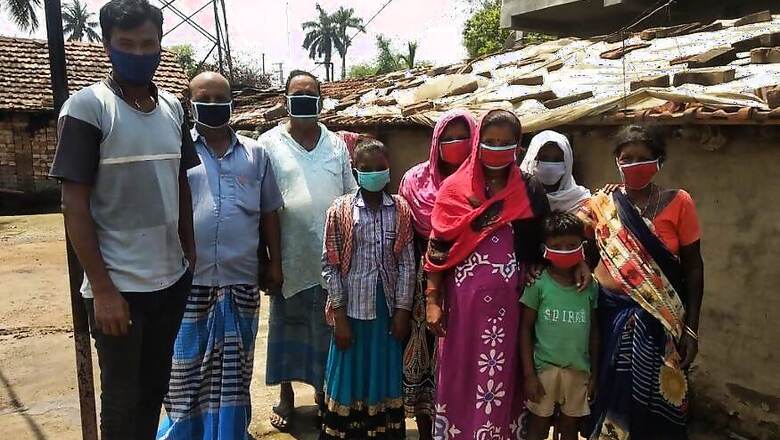
views
Aarti Kumari sits crouched beside a burning coal oven that balances an aluminum bowl, frying half-a-dozen slice potato chunks in it. It's past noon as she makes lunch outside her mud and brick hut at the kiln.
A resident of Jharkhand, Aarti is among some 90 odd migrant workers who are involved in making bricks at one of the many kilns based in West Bengal's Hooghly district.
While the coronavirus lockdown hasn't been kind to the country's lakhs of migrant workers, who had no choice but to start trudging back to their native villages with families in tow, the perils of the unprecedented crisis seem to have dealt a lighter blow to some of these workers and their families in West Bengal.
The state has a little over 11,000 brick kilns out of which 7,000 are functional, scattered in many of its districts that employ over 8 lakh workers. Most of the migrant workers employed at these kilns stayed back when Prime Minister Narendra Modi announced the lockdown after the 'Junta Curfew' on May 22.
The brick kiln industry has often been pulled up for not standing by its contractual workforce and leaving them with bare minimum resources coupled with unhealthy living and work conditions. But, contrary to the abysmal standard, many kiln owners have reached out to their workers and provided then with ration and the basic needs till some normalcy returns.
Bacchi Devi, who works at the Bengal Brick Field in Hooghly's Adhishaptgram and hails from Sapora village in Bihar, says she can't believe how things have changed in a jiffy. "Itne saalo mein aisa kabhi nahi hua, lekin tumko idhar theek hi lag raha hai. Khaana paani bhi diya gaya, abhi ghar jaane ki umeed hai" (Never seen anything like this before, but we didn't face too many problems. We got ration and water. Hoping to go back home now).
She has been working in brick kilns for the past 20-25 years and hopes to return to work if the owners call her back. Her brother, Brij Ram, who suffered a partial loss of speech after an accident a few years ago, is also employed at the kiln and distributes tokens for orders.
During the first couple of weeks of the lockdown, rations, face masks and sanitisers were provided to the workers. For an average three-member family, the owners supplied them each with 5kg of rice, potatoes and 4 litres of oil weekly along with the weekly wage of Rs 400-500 per worker. After the initial period, when shops started opening nearby, the workers started to take turns to buy essentials along with the ration provided by the government.
Tale of tragedies of migrants have reached these kiln workers who are grateful for the basic support they have been provided with. Khudiram Gundua, who hails from Jharkhand's Chakradharpur, recounts how his brother-in-law Chhotu, who was working with a bridge construction crew in Hyderabad, had to peddle for six days to reach his home after work stopped due to the lockdown.
But Bengal Brick Field owner Tapas Dasgupta says he isn't doing anything out of the ordinary for his workers. "But that's the thumb rule of the brick-making business. We have always paid for their travelling from their home town to workplace and vice-versa. It's just that now we are arranging for transportation instead of giving them money for it."
Ashok Tiwari, the Vice President of All India Brick and Tile Manufacturer Federation, says that the owners have tried to help as many workers as possible.
"With work halted during peak summer in April and no sale, the owners have been supporting the workers as much as they can. The state government has been involving us in policy-making, so I am hopeful that they will help us to revive the industry once the lockdown period is over."
With the Centre now facilitating the travel of workers across the country, some of these owners have started sending their workers back to their homes.
Jayant Das, who owns DMB Enterprise in the area, says half of his workers in the production team are from Bihar who left a few days ago. "We arranged buses for them as it would have been troublesome for them with long queues before being able to board the trains."
Others who hail from Gaya, Nawada in Bihar, or parts of Uttar Pradesh and Chhattisgarg will also be on their way as and when the buses are arranged.
Meanwhile, as they wait their turn to go home, most of the migrant workers have turned to their phones for amusement. "We watch Bhojpuri and Hindi songs. They are quite a rage," quips an 18-year-old, perched atop a mountain of deformed bricks.


















Comments
0 comment